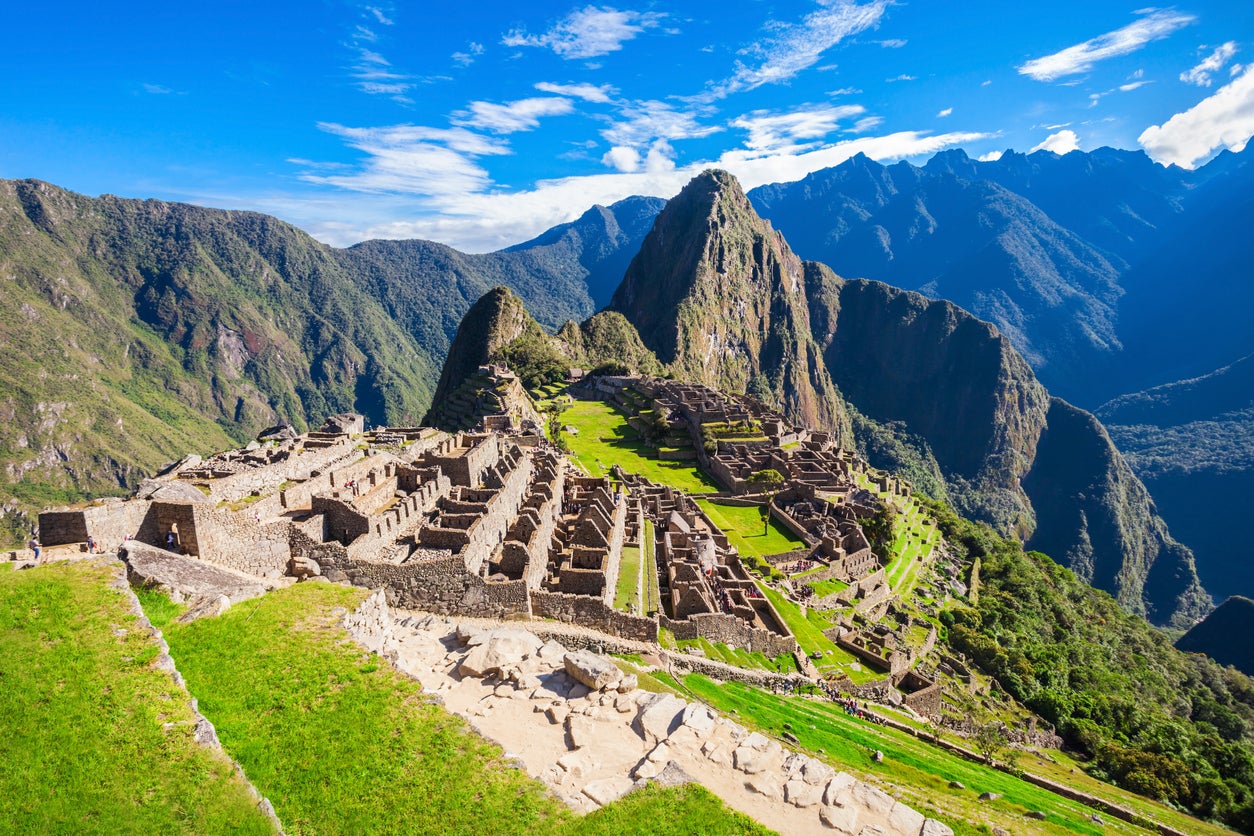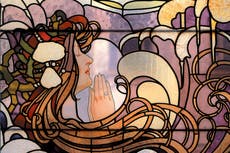The striking workers who shut down Machu Picchu
In recent years, locals have grown frustrated by what they see as a market controlled by the railroad and large hotel owners, write Samantha Schmidt and Michael Robinson Chavez

If it were a normal day, thousands of tourists would be stepping off the train and into this picture book town high in the Andes; the gateway to the ancient Inca ruins.
But on this day the 15th century citadel is closed shut, its magnificent stone terraces bereft of visitors. The tracks that bring tourist trains to one of South America’s most visited attractions have been removed or blocked, cutting the town off from the rest of Peru. The hotels and restaurants and handicraft market that ordinarily buzz with paying customers are silent.
Then a man in the central plaza begins banging a large drum. People carrying bright red and white Peruvian flags form a crowd. And a woman with a megaphone calls on neighbors to demand that their country’s government – and the world – listen to them.

“Good morning, neighbors,” shouts Irma Pereyra, 49, who sells artisanal crafts in the market. “Today begins a radical strike!”
Peru has been roiled by weeks of protests demanding the resignation of president Dina Boluarte. After the death toll passed 50 last week, the people who rely on Machu Picchu tourist money to feed their families voted to take a stand.
The town of about 7,000 people, often marketed as Aguas Calientes, agreed last Friday to declare a “total strike”, shutting down all businesses in solidarity with the nationwide demonstrations. They urged the country’s Ministry of Culture to close the ruins to the public, to keep protesters from neighboring towns from invading their ancestral sanctuary. Ministry officials closed the citadel on Saturday, citing the safety of tourists.
The Unesco World Heritage site, which generates tens of millions of dollars for Peru each year, was only just recovering from the coronavirus pandemic. The severing of the rail link had already slowed the flow of tourists to a trickle, and cut off the town's only supply route for food and fuel. Now the strike brought the local economy to a standstill, indefinitely.
But the sacrifice will be worthwhile, people here say, if it sends a message to a central government that has long benefited from the town while ignoring its demands. Under Peruvian law, the municipality of Machu Picchu receives 10 per cent of its total revenue from the park. But for years, townspeople say, corrupt politicians have allowed big businesses to monopolise tourism here, leaving little to trickle down to the people.

“This democracy is no longer a democracy!” dozens chant as they marched past shuttered hostels, restaurants and massage parlors toward the entrance of the ruins. They cover the shuttered gate with a black-and-white anti-corruption flag and circled around.
“If there isn’t a solution,” they chant, “we’ll take over Machu Picchu!”
David Moreno Riveros, a strike leader, says he won’t allow it to go that far. That night, he tells the crowd, townspeople would meet with their mayor and decide whether to continue the strike.
He argues that they should. Weeks of protests and at least 56 deaths had not brought down Boluarte. If they could make a statement at the globally beloved marvel, Moreno hopes, governments, organisations and individuals abroad might start paying attention.
“We are here,” Moreno shouts. “But no one is listening to us.”
Without trains, the only way we can reach the town is on foot.
We travel at night, to avoid roadblocks. First our driver, Pit Bull, steers our Toyota SUV around the sharp turns of mountain roads littered with boulders planted by protesters. The following morning, led by a 62-year-old, chain-smoking guide, we begin our hike: nearly seven miles along the unused train tracks, followed the entire way by a small black stray dog.

We pass empty camp sites and restaurants and, occasionally, people with wheelbarrows or burlap bags to carry food and supplies to their town. A trek that normally involves a quick train ride that costs locals about $1 now requires a two- to three-hour walk each way.
“Tourism maintains us all,” says Carlos Soncco, 54, who ordinarily runs a small bar in town. “The strike hurts us all.”
Juan Carlos Durán, 39, sells postcards at the entrance to the ruins. On Monday morning, he was hiking hours to buy chicken to sell back home.
After nearly three hours, we arrive in the town of Machu Picchu, its hotels and restaurants densely stacked over narrow streets along the Urubamba River. The municipality – a 20-minute walk from the ruins – was established only a few generations ago, in 1941, 30 years after American explorer Hiram Bingham III brought the site to the world’s attention.

The site soon began to draw tourists, and the town grew. But in recent years, the people have grown frustrated by what they see as a market controlled by the railroad and large hotel owners. Tourists increasingly book their travel through agencies, not local businesses, and many visit and return to Cusco on the same day. Few tourists spend much time in the town, locals say.
The pandemic shut tourism down for seven months. When the citadel reopened, the government capped the number of tourists at 2,244 per day. After the town’s residents protested, the limit was raised to 4,044, but locals say it’s not enough.
Peru’s rural poor believed they finally had their champion in Pedro Castillo, the left-wing former schoolteacher who was elected president in 2021. But once in office, he proved inept, chaotic and allegedly corrupt. When he tried in December to dissolve Congress and rule by decree, Congress impeached him.
Boluarte was his vice president. Since she succeeded him, his supporters say she has been captured by the right wing.
On Tuesday, Boluarte called for a truce with protesters. But she also accused some of having ties to “radical groups that have a political and economic agenda based on drug trafficking, illegal mining and smuggling.”
Hours after she spoke, on the tracks just outside the town of Machu Picchu, residents burned cardboard coffins emblazoned with “DINA”, and accused her of murder.
But their protests are coming at a high cost.
With businesses closed, people are struggling to pay rent. Some have begun making a communal meal in the town plaza each day to help feed newly needy families. Food scarcity has sent prices soaring. Tomatoes, which usually cost about 75 cents per kilogram, now cost more than $2.50.
Felicitas Vilca Ochoa, a 62-year-old who sells juices in the market, says she has thought about leaving Machu Picchu in search of a new source of income elsewhere.
Yushara Roque, 33, has kept her shop open. She feels she doesn’t have a choice – she has just used the last of her savings to pay her bills that day. She supports the idea behind the protests but doesn’t see the point.

“From here, I don’t think we can do anything,” she says, breastfeeding her six-month-old.
After three days of protests, the people of Machu Picchu pack the town theater on Monday night to make a decision: is it worth continuing the fight?
Mayor Elvis La Torre provides a word of caution. Tourists are canceling plans to visit. The town is in crisis – and the strike is making it worse. “Our children need to eat,” he says. “We are killing the line of gold, and that will bring serious consequences now and in the months to come.”
But as resident after resident rises to speak, it is clear their minds are made up. Even if they lift the strike, Pereyra says, tourism won’t return to normal levels and the town will continue to struggle. This is their chance to demand change.

“Machu Picchu is its people, and the people need to be able to benefit from our marvel,” she says. “It can’t only serve the big ones. Tourism needs to benefit us.”
The vote is unanimous: the strike will continue. The crowd cheer: “El pueblo unidojamás será vencido” (or “The people, united, will never be defeated”).
The next day, officials say, a humanitarian train will carry residents most of the way to the nearest towns to buy food and supplies. But when the day comes, no train arrives. We find an alternative way of getting back: a small wooden rail cart powered by a motorbike. It had transported the mayor earlier that day.
© The Washington Post
Join our commenting forum
Join thought-provoking conversations, follow other Independent readers and see their replies
Comments





Bookmark popover
Removed from bookmarks